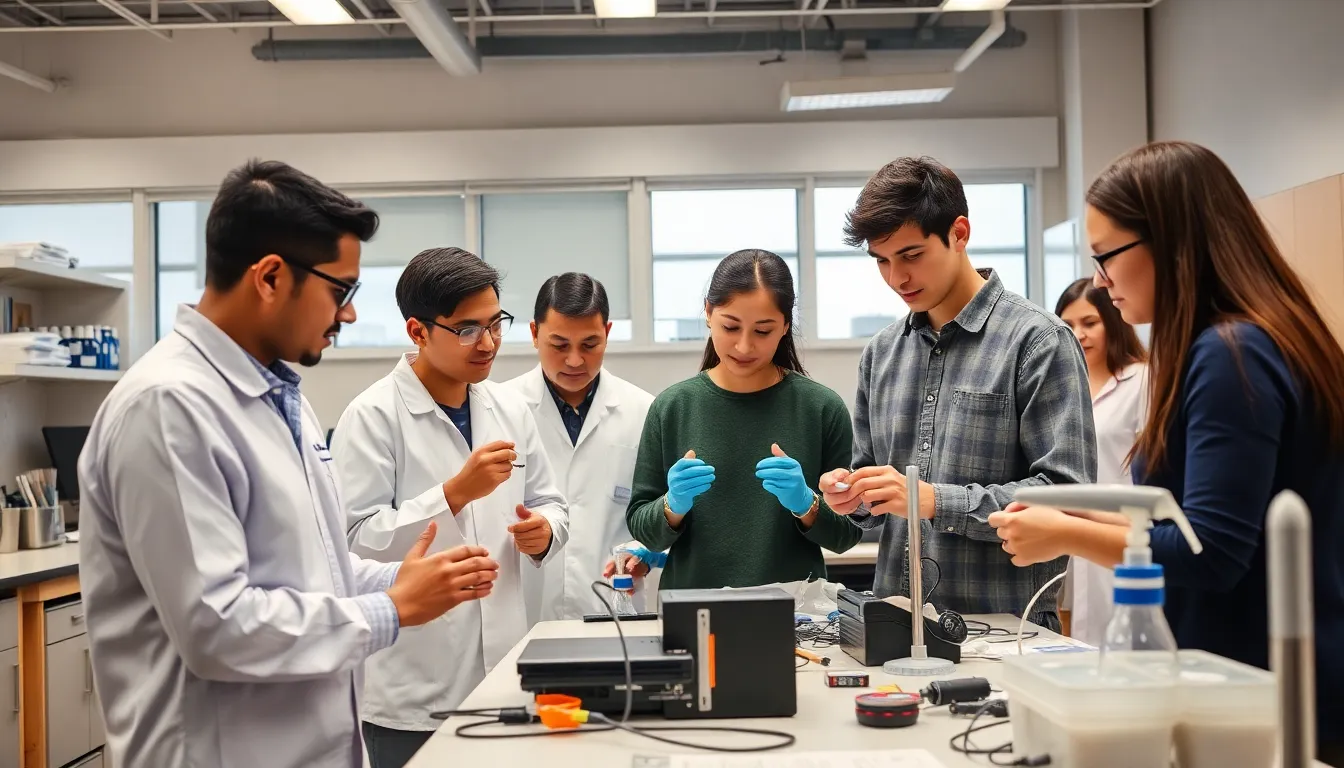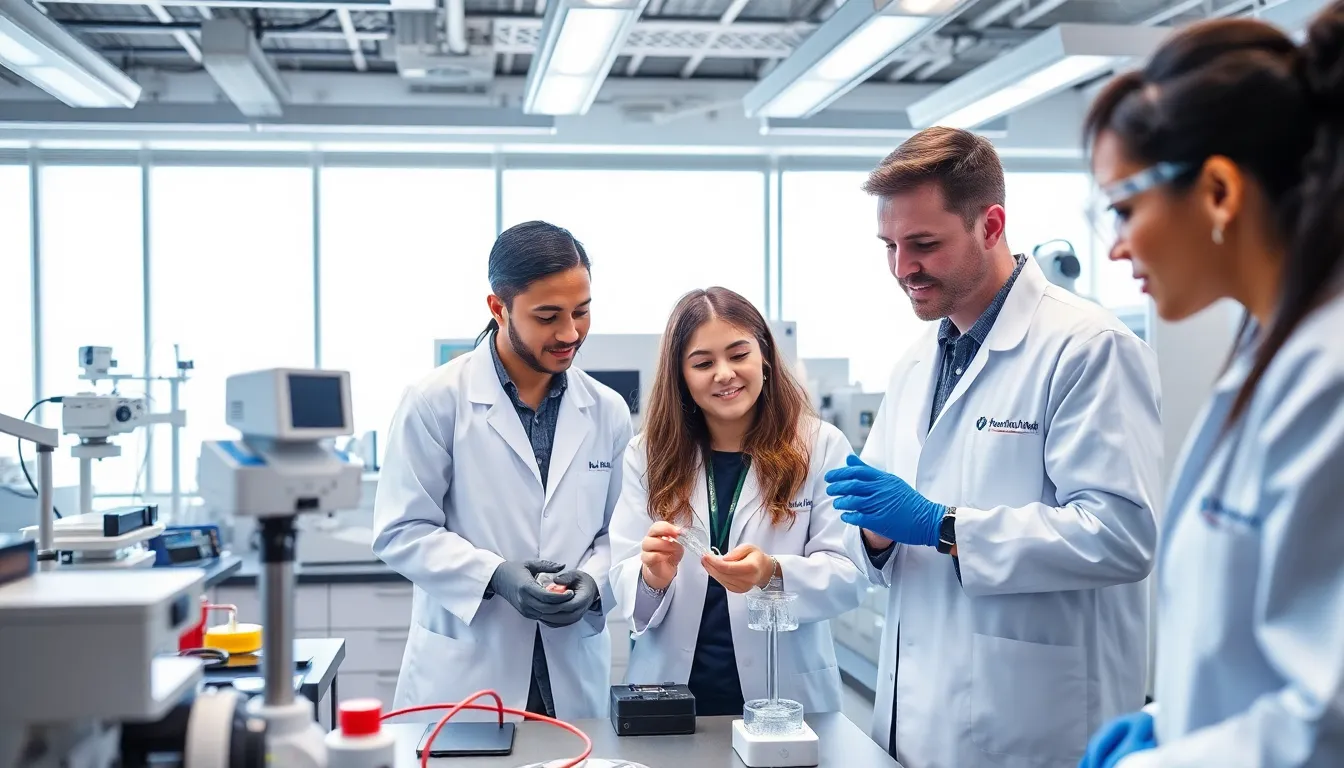Table of Contents
ToggleGeorgia Tech’s biomedical engineering program is where innovation meets impact. Imagine combining the precision of engineering with the compassion of healthcare—sounds like a superhero origin story, right? This program isn’t just about textbooks and lectures; it’s about crafting solutions that could save lives, one brilliant idea at a time.
With cutting-edge research and hands-on experience, students dive into the world of medical devices, tissue engineering, and beyond. They’re not just learning; they’re shaping the future of medicine. So whether it’s designing the next life-saving gadget or figuring out how to make a prosthetic leg that dances, Georgia Tech’s biomedical engineers are ready to take on the challenge. It’s a place where creativity and science collide, and the results are nothing short of extraordinary.
Overview of Georgia Tech Biomedical Engineering
Georgia Tech’s biomedical engineering program stands out for its innovative approach to healthcare challenges. Students merge engineering concepts with healthcare solutions, creating a unique educational experience. Research opportunities abound in areas like medical devices and tissue engineering, enabling students to make significant contributions to the field.
Engagement in interdisciplinary projects enhances problem-solving skills. Students collaborate with peers from various backgrounds to tackle real-world medical issues. The program emphasizes hands-on learning, allowing individuals to experiment with cutting-edge technologies that can revolutionize patient care.
Faculty members possess extensive expertise in biomedical engineering and related fields. Their guidance supports students as they navigate complex projects and research initiatives. This mentorship fosters an environment where creativity flourishes alongside scientific rigor.
Industry partnerships play a crucial role in bridging the gap between academia and real-world applications. Through internships and co-op programs, students gain practical experience and network with professionals in the field. These connections often lead to job opportunities after graduation.
Moreover, students benefit from state-of-the-art facilities and resources. Access to laboratories equipped with advanced technologies enables exploration of innovative solutions. Collaborative spaces encourage teamwork and the exchange of ideas, vital for fostering creativity.
Georgia Tech’s commitment to improving health outcomes drives its biomedical engineering curriculum. Focused on shaping the future of medicine, the program equips graduates with the skills necessary to create impactful, life-saving technologies. Continuous adaptation to advancements ensures that students remain at the forefront of biomedical innovation.
History and Development

Georgia Tech’s biomedical engineering program has evolved significantly since its inception, reflecting the institution’s commitment to combining engineering principles with healthcare solutions.
Founding and Early Years
The program began in 1997 as a joint effort between the College of Engineering and the College of Sciences. Initial focus centered on integrating engineering methods with medical knowledge. Early initiatives included developing courses in biomedical engineering fundamentals while encouraging partnerships with nearby healthcare facilities. Faculty members with diverse expertise played a vital role, fostering interdisciplinary collaboration.
Milestones in Growth
Growth milestones mark significant advancements in research and education within the program. In 2006, Georgia Tech introduced its Ph.D. program, enhancing academic offerings. This expansion promoted research in medical devices and tissue engineering among graduate students. The establishment of dedicated research centers, such as the Wallace H. Coulter Department of Biomedical Engineering in partnership with Emory University, further solidified its reputation. In recent years, increasing industry partnerships provided valuable internship and co-op opportunities. These collaborations ensured students gained real-world experience, contributing to the program’s continuous development and impact in the biomedical field.
Program Structure and Curriculum
Georgia Tech’s biomedical engineering program offers a comprehensive curriculum that emphasizes foundational knowledge and hands-on experience. Students engage in an innovative educational journey, preparing them for real-world applications in healthcare.
Core Courses
Core courses form the backbone of the biomedical engineering curriculum. All students take classes such as Introduction to Biomedical Engineering, which covers key engineering principles. Additional core subjects include Biomechanics, focusing on the mechanics of biological systems, and Biomaterials, which explores materials used in medical devices. Medical Imaging introduces students to advanced imaging technologies, while Bioengineering provides insights into biological systems through engineering concepts. Each of these courses equips students with essential knowledge and skills, fostering a solid understanding of the biomedical field.
Specializations Offered
Students can select from various specializations to tailor their educational experience. Options include Biomechanics, where learners delve into the movement of humans and animals, and Biomaterials, which focuses on the development of materials for medical use. Tissue Engineering emphasizes the growth of biological tissues, while Medical Devices covers the design and development of innovative medical technologies. Students also choose specializations like Biomedical Informatics, which combines data analysis with healthcare applications. Each specialization allows for in-depth exploration of specific interests, enhancing career readiness in the biomedical engineering sector.
Research Opportunities
Georgia Tech’s biomedical engineering program offers extensive research opportunities, enabling students to engage in transformative projects that impact healthcare.
Labs and Facilities
State-of-the-art labs and facilities support research at Georgia Tech. The Clinical Research and Engineering Laboratory facilitates collaboration between students and faculty, focusing on medical device development. Advanced imaging facilities enable researchers to conduct in-depth studies on biomaterials and tissue engineering. Additionally, specialized spaces for biomechanics research allow for innovative studies into human movement and injury prevention. Access to cutting-edge technology enhances the learning experience and reinforces practical application.
Notable Research Projects
Prominent research projects highlight the program’s commitment to solving real-world challenges. One such initiative includes the development of wearable health monitoring systems, which aim to provide continuous patient data for improved treatment options. Another project focuses on bioengineered tissues that can replace damaged organs, demonstrating significant potential in regenerative medicine. Collaboration with industry partners fosters real-world applications, ensuring that research efforts translate into impactful healthcare solutions. These projects showcase the program’s dedication to pioneering advancements within the biomedical engineering field.
Career Prospects for Graduates
Georgia Tech’s biomedical engineering program offers promising career prospects for graduates, reflecting the growing demand for innovative solutions in healthcare. Graduates enter a vibrant job market equipped with skills that integrate engineering principles and medical knowledge.
Industries and Jobs
Graduates pursue careers in diverse industries such as medical device manufacturing, pharmaceuticals, and healthcare consulting. Positions include biomedical engineer, quality assurance specialist, and research scientist. Many find roles in regulatory affairs, focusing on compliance with health standards and safety regulations. Startups focused on biotechnology frequently hire graduates for their innovative backgrounds. Additionally, healthcare institutions employ graduates as clinical engineers, directly impacting patient care through advanced technology.
Alumni Success Stories
Alumni of Georgia Tech’s program have made significant contributions across various fields. One notable example includes a graduate who developed a groundbreaking medical imaging technology that enhances the accuracy of diagnostics. Another alumna founded a successful startup that specializes in innovative prosthetics, improving mobility for patients. Many alumni work at leading firms like Medtronic and Boston Scientific, where they continue to drive advancements in medical devices and solutions. Their success illustrates the program’s impact and the strong network of professionals dedicated to transforming healthcare practices.
Georgia Tech’s biomedical engineering program stands as a beacon of innovation and excellence in the healthcare sector. With its unique blend of engineering principles and compassionate healthcare solutions, it prepares students to tackle real-world medical challenges. The program’s emphasis on hands-on experience and interdisciplinary collaboration fosters an environment where creativity thrives alongside scientific inquiry.
As graduates enter a rapidly evolving job market, they carry with them the skills and knowledge necessary to drive advancements in medical technology. Their contributions not only enhance healthcare outcomes but also pave the way for future innovations. Georgia Tech continues to shape the next generation of leaders in biomedical engineering, ensuring a lasting impact on the field and society as a whole.




